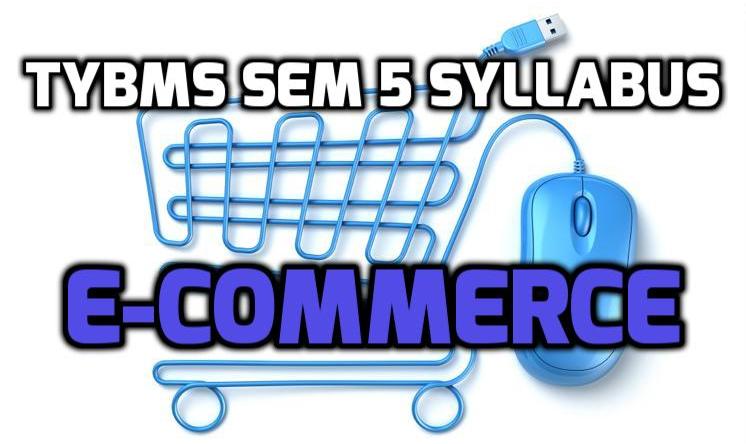E-Commerce is a Semester 5 elective subject of TYBMS (Mumbai University exam). E-Commerce or Electronic Commerce is online trading of products or services. Modern E-Commerce uses world wide web and includes other technologies like mobile commerce, electronic funds transfer, internet marketing, online transaction processing, electronic data interchange and so on.
Here we present the detailed syllabus of E-Commerce:
Unit 1 – 15 lectures
Introduction to E-Commerce:
- Introduction to role of IT in business and different applications.
- Role of ICT in Communication and business applications.
- Different application of IT in global business scenario.
- Introduction to IT act and its role to encourage e-business.
- Growing e-learning and e-governance.
Evolution and Types of E-Commerce:
- Evolution of e-commerce. Global and Indian scenario.
- History of e-commerce, Generic model of e-commerce.
- Definition, classification – B2B, B2C, C2C, G2C, B2G sites
- Factors of growth and key performance indicators of E-Commerce.
Unit 2 -15 lectures
E-Commerce Models:
- E-commerce models – storefront model, brick and mortar model
- Build to order merchant model, service provider model, subscription based model,
- Broker model, advertiser model, virtual mall model and infomediary model.
Sub-systems of E-Commerce:
- E-commerce trade cycle and trading process
- E-market and internet commerce
- EDI and working mechanism of EDI
- Identify factors that are important for an e-commerce
- Difference between conventional commerce and electronic commerce.
Unit 3 – 15 lectures:
Payment, security and privacy issues in online business:
- Issues relating to privacy and security in online trading
- Electronic payment systems – credit cards, debit cards, smart cards, e-credit accounts, e-money
- Security concerns in e-commerce, authentic, privacy, integrity, non-repudiation, encryption
- Cryptography techniques and restrictions placed by them on exports
- Securing networks using firewalls and other machines.
Marketing Trends in E-Business:
- Growth of online retailing and e-marketing concepts
- Online advertising and revenue generation
- Use of online market research and use of CRM techniques
- Growing use of content management systems
- Integration of e-commerce in business lines
- Different service provider – utility
Unit 4 – 15 lectures
Building E-presence:
- Architecting and e-business and website design
- The building lifecycle
- Design criteria and attracting customers
- Site content and traffic management
- Using content management system
Emerging Trends of M-Commerce:
- Emerging trends of M-commerce
- Infrastructure of M-Commerce and comparison between e-commerce and m-commerce
- Security and bandwidth issues in e-commerce
- Trading process in M-commerce
- Trends in technology, developing markets for e-commerce.
Reference Books of E-Commerce:
- E-business and e-commerce management – Pearson education
- E-business 2.0 road map for success – Kalokota, Robinson
- Electronic commerce – Elias M. Awad
- Electronic Commerce, a managerial perspective – Erfan Turban
- Electronic Commerce, a manager’s guide – R. Kalokota, Andrew V. Winston
- E-commerce – Prof Munesh Chandra Trivedi.




44 Comments